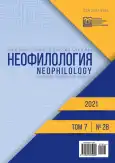Art of theater direction in the 20th–21st centuries
- Authors: Chebotarev S.A.1
-
Affiliations:
- Derzhavin Tambov State University
- Issue: Vol 7, No 28 (2021)
- Pages: 718-725
- Section: КУЛЬТУРОЛОГИЯ
- URL: https://journal-vniispk.ru/2587-6953/article/view/302413
- DOI: https://doi.org/10.20310/2587-6953-2021-7-28-718-725
- ID: 302413
Cite item
Full Text
Abstract
We analyze the cultural and historical development of art of theater direction in the 20th–21st centuries. We consider the features of director’s theater on the example of Anatoly Vasiliev’s theater, Mark Zakharov’s theater, Zhenovach’s theater, Pyotr Fomenko’s theater, etc. We note that throughout the entire period there is a transformation of the role of the director in the theater. We note that throughout the entire period there is a transformation of director’s role in the theater. The significance of the theater director – artist grows into more complex forms of his existence: the playwright – the organizer of the performance – the teacher and educator of the theatrical collective. We conduct an analysis of directing schools allow us to draw the following conclusions. Firstly, the Russian theater at the turn of the 20th–21st centuries managed to preserve its traditions even in the conditions of the most powerful computer and television boom. Secondly, the theater continued to occupy one of the leading places in the spiritual, moral and aesthetic education of society. Thirdly, the direction of domestic theater adopted and multiplied the best traditions of realistic art, coming from K. Stanislavsky, V. Nemirovich-Danchenko, E. Vakhtangov, M. Chekhov, taking into account modern trends and interests of the audience. Fourthly, there was an active search for new forms in directing and acting, experimental theaters and studios were formed. Fifthly, a huge place in directing was given to the production of classics. We note that the period under review provided an opportunity to fully reveal the originality in directing and acting.
Keywords
About the authors
S. A. Chebotarev
Derzhavin Tambov State University
Author for correspondence.
Email: serzh.chebotarev.tsu@mail.ru
ORCID iD: 0000-0003-3963-6180
Candidate of History, Acting Head of Performing Arts Department
Russian Federation, 33 Internatsionalnaya St., Tambov 392000, Russian FederationReferences
- Vasilchenko N.N. Otechestvennaya teatral’naya kul’tura v situatsii postmodernizma (opyt kul’turologicheskogo analiza) [National theatre culture in a situation of post-modernism (experience of cultural analysis)]. Kul’tura i vremya peremen [Culture and Time for Change], 2018, no. 1 (20), pp. 24. (In Russian).
- Darie B. The art of acting: intercrossing borders between science and art. Klironomy, 2021, no. 1 (1), pp. 138-149.
- Sazonova V.A. Traditsii i novatorstvo v prepodavanii sovremennogo akterskogo iskusstva [Traditions and innovation in teaching of modern performing arts]. Sotsial’no-ekonomicheskiye yavleniya i protsessy – Social-Economic Phenomena and Processes, 2012, no. 4 (38), pp. 160-165. (In Russian).
- Lorka F.G. O teatre [About theatre]. In: F.G. Lorka. Teatr [Theater]. Moscow, 1957, pp. 29-32. (In Russian).
- Sazonova V.A. Teatral’naya pedagogika: traditsii i sovremennost’. Istoriya, teoriya i praktika [Theater Pedagogy: Traditions and Modernity. History, Theory and Practice]. Tambov, Publishing House “Derzhavinsky”, 2019, 470 p. (In Russian).
- Ostrovsky A.N. Avtobiograficheskaya zametka [Autobiographical note]. A.N. Ostrovsky o teatre: Zapiski, rechi i pis’ma [A.N. Ostrovsky about the Theater: Notes, Speeches and Letters]. Moscow, Leningrad, 1947, pp. 182-239. (In Russian).
- Vellington A.T. Sovremennyy teatr. Eksperimenty nad formoy i soderzhaniyem [A modern theater: experiments over forms and content]. Istoricheskaya i sotsial’no-obrazovatel’naya mysl’ – Historical and socio-educational thought, 2017, vol. 9, no. 3-1, pp. 139-145. (In Russian).
- Iksanova G. Teatr bez granits [Theater without borders]. Vatandash, 2018, no. 7 (262), pp. 199-204. (In Russian).
- Nikiforova V. Krizisa teatra ne budet [There will be no theater crisis]. Teatral’naya zhizn’ – Theatre Life, 1991, no. 23, pp. 51-55. (In Russian).
- Serdobolskiy O. Petr Fomenko v inter’yerakh peterburgskoy zimy [Pyotr Fomenko in the interiors of the St. Petersburg winter]. Teatral’naya zhizn’ – Theatre Life, 1995, no. 3, pp. 8-9. (In Russian).
Supplementary files









